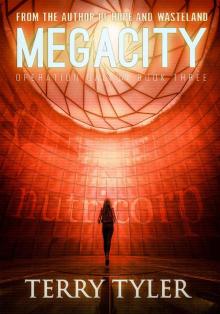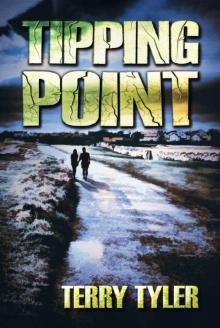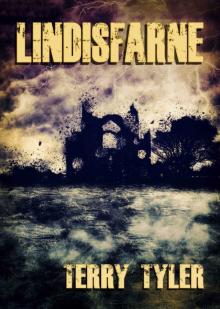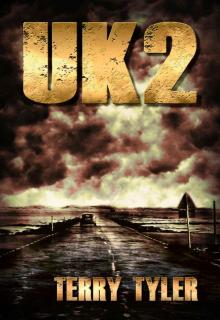- Home
- Terry Tyler
UK2 Page 3
UK2 Read online
Page 3
I thought I could rely on my parents absolutely, and after them I thought Adam would always be there to take care of me, but now I am learning self-reliance.
I still live in the house with Vicky and Lottie, but it's not so nice now. Lottie drinks too much. Jax used to live with us, but he moved out after his dad was murdered. I tried to counsel him, and said that I understood because my dad was killed in horrid circumstances, too, but he said I hadn't got a clue what I was talking about, and stormed off. For days afterwards I expected him to come back and apologise, but he never did.
He is suffering from bereavement, which I was surprised to find listed in the book about psychological disorders that Suzanne lent me; I didn't realise it was an actual illness.
Vicky only lives here some of the time, when she is not at the castle with Dex. She is depressed, because she was very good friends with Jax's dad. Dex takes care of her; I have to say, I don't think she always appreciates him or all he does for the community.
I've got to know him quite well because I spend more time at Suzanne and Naomi's school than our house and I, for one, respect him very much. He is often there to see his son, Phoenix, whose mother is Naomi; it's all very complicated. I love being with the children. I have no qualifications to teach, of course, but I help with art and nature lessons, and the nursery. They're such sweet children, from decent families who had the vaccination, although Bradley is a bit of a handful. The other day Suzanne said it's because he doesn't get enough positive affirmation from his mother, so he seeks attention.
Ozzy said, "It's because he doesn't get enough smacks on the arse."
Which was a bit cheeky, but I couldn't help smiling.
Everyone tells me how good I am with the children, which makes me feel all warm inside. Dex says we're shaping the adults of the future.
My father used to say to me that the higher your position, the fewer people like you; he was a distribution manager at Maxlo and had to deal with all sorts of petty complaints from his staff. Dex faces the same problems. Well, he won't get any trouble from me. We all have our place in this community, and as well as my work with the children, I contribute by helping with the baking. I use the recipe for Mummy's no-butter lemon drizzle cake, though I have to use those lemon slices in jars that they used to have in pubs for the drinks, instead of fresh lemon zest.
Thinking about making cakes with my mother makes me feel sad, but I push that out of my mind, because you just have to jolly well get on with things these days. That's what Rowan says; she runs the hotel where all food is stored and prepared. She used to be married to a corporate tax lawyer who died of the virus. I was surprised at first, because I thought professional people were all given the vaccination, but he had to go away on business and missed his appointment.
Living here is broadening my outlook, I must say. Mummy used to call working class people 'common', and Daddy would shush her up and tell her that you couldn't say that sort of thing nowadays, and that everyone has their role in society. Like Paul and Davina; they're working class—Paul was a builder and Davina was a cook in a school—but they were hardworking and wanted to better themselves, and now they're some of my very best friends, even though they're what my mother would have called 'common'.
Mummy taught me that you could tell a person's worth by how they held their knife and fork and whether they knew how to dress appropriately for any occasion, but I think she was wrong. People like the Lincolns were of far more use to society than, say, a drunk from an upper class background. So they got the vaccination, even though they hold their knives like pencils.
Davina is like my second mum and my best friend rolled into one. She and Paul are among the few people here who aim to maintain the way of life we had before, which is no small task. Some of the islanders seem to revel in there being no law and order. Others treat Lindisfarne like a hippie commune. Lucas, for example, who hit the man who was trying to steal the petrol; he turned up in April with three others called Rob, Kelly and Bev. They'd been living rough after escaping from a military-run camp where you had to have regular medical check-ups and weren't allowed out of the camp if you weren't vaccinated, in case you brought the disease back. Which is fair enough, I think, but I went to their house the other day because I'd been asked to bake a cake for Kelly's birthday—she gets very down in the dumps because she lost her whole family, including her baby—and they were living like pigs. Candle wax all over the place, empty tins on the coffee table, and they all looked as if they could do with a good wash. Bev actually smells. She's about fifty, and used to be a teacher. You'd think a teacher would have higher standards. Ozzy says she keeps asking him to give her an Indian head massage, and he's running out of excuses.
Myra says it's not just an Indian head massage that she's after.
It's not easy, living like we do, but we can still keep clean, even though it takes more time and effort. My mother was very particular about cleanliness, and had a nervous breakdown when the water went off, partly because she couldn't have her daily bath, but the worst thing for her was not having a flushing toilet. She stopped eating because she couldn't bear to use buckets, and Daddy had to force-feed her.
It was awful.
I try not to think about it.
Suzanne says I have to concentrate on the positive, and feel empowered by what I've achieved. So that's what I'm doing.
I've felt excited since the conversation with Paul and Davina. This can't be all there is. It can't be. We're civilised, we have science and technology, so we can't go back to living like savages. Some of the things that happen here are so dreadful. A girl turned up last month who was pregnant, and she killed herself. Her name was Janey. Suicide is a sin against God; that really shocked me. I'm lucky that never happened to me when I was with those horrible men, but one of the girls, Deb, was really kind, and got me the pill.
I can't think about Deb. That really is too bad a memory.
No one can be expected to live like this, indefinitely.
I just keep hoping that one day I'll get my real life back. It must be possible. It must be.
Chapter Four
Vicky
July 2026
I talk to Phil, about Heath.
He likens our relationship to the lives of Marilyn Monroe, or Princess Diana, or James Dean—forever beautiful and mourned, because it was cut off in its glorious prime.
"You lost him when you were in the honeymoon stage," he says. "You never had to deal with that tangle of guilt and self-loathing inside his head. I loved the bloke, we all did, but underneath that charming smile was a whole mess of complication."
"I could have dealt with it." Talking about him still chokes me up, every time. "It was the real thing."
"I'm not doubting or disputing that." Phil's voice is kind. "But look at the evidence. He relied on medication to keep his emotions stable, until he was able to swap them for the much more agreeable crutch of your love. When the going got tough, he ran; he left Jax on his own after his mother died, didn't he? When the boy must have needed him so badly."
"No one could have felt worse than he did about that."
"I'm sure. He was a decent person. But he was trapped in a cycle of hating himself for the mistakes he made, blocking them out, then bouncing back and making a whole bunch of new ones. Everything was high emotion."
"I'd stopped all that. He said I made everything alright."
"You did. But looking to someone else to cure your life never works that well."
I laugh. "Oh, come on. Don't we all do that, to a certain extent?"
Phil nods. "Yes. We do. With Heath, though, it was always the quick fix; he began an affair when he couldn't cope with his marriage. He started up with Aria behind poor old Travis's back to ease the pain of losing you to Dex, and then he was unfaithful to her with you—"
I bristle. "So you think he would have been unfaithful to me, too?"
"No, no. You're right, he'd found the one he'd been looking for, as you had with him,
but he had that combination that can so often lead to turmoil: he was attractive and charismatic, so he drew people to him, but he was also emotionally needy and intense. I would hate you to think that you've lost your one chance for happiness; you haven't."
"If you say so," I whisper.
"Okay." He smiles again. "But if things don't work out with Dex, there might be someone else for you, some time, with whom you can be just as happy. Or happy in a different way."
"Maybe." I can't see it.
Then there's the other thing.
If things don't work out with Dex.
Often, I forget we're even supposed to be a couple. He's become more like a supportive relative than my boyfriend. We don't have sex because I can't bear to, after Heath, and that's unfair to him, I know. He's so patient with me; it's weird; sometimes I wonder if he suspects about Heath and me, and is just waiting for me to get over it.
I imagine he's sleeping with Naomi. I should tell him to go to her, instead of propping myself up on him. At least Phoenix would have a proper dad.
Some mornings I think, right, today I will give myself a kick in the pants and stop being so pathetic, but I feel so damn tired.
Losing Heath has brought the pain of losing my parents to the fore, too. Sometimes I'm crying about Heath and I end up crying about Mum and Dad. Or my friends, Claire, Lawrie and Gemma, who all died in the first couple of weeks. It's like his death has triggered everything I've kept stored away for so long.
Dex has got more important things to think about than the state of our relationship; I can imagine us jogging along like this indefinitely. People stuck with worse relationships than ours, even before bat fever.
I must make decisions. Take action. I will. Just not today.
Chapter Five
Lottie and Martin
August 5th, 2026
Lottie
My sleeping routine is totally fucked. I lie awake half the night, fall asleep in the early hours and wake up shattered. When I've had a bad night, Mac doesn't let me go out on supply runs in case my reactions aren't quick enough to deal with any 'situations' we may get into. I argue, but I know he's right.
Last night was a crap one, so today I'm in the hotel with Mum, Davina and a noob called Julie, making bread.
Davina says she can smell autumn in the air already.
"I know what you mean," Mum says. "I always smell the seasons at least a month before they start." She stops, with her hands in the dough, and gazes into the bowl. "I used to love autumn. Now it just means 'hello, winter', doesn't it?"
It's, like, the beginning of August. Cheers for the doom and gloom, Mom.
"I used to love it, too," Julie says. She's making bases for our 'pizzas'—tinned tomatoes, pesto, powdered parmesan cheese, slivers of tinned ham, or tuna, anchovies and olives. "Wasn't it exciting when all the jumpers and boots arrived in the shops? And all the new season stuff on the telly; I must say, I do miss Strictly."
Jesus Christ. This is why I don't get to know the noobs.
Davina is just about to reply (probably something else about retarded TV shows) when Rowan comes in. She glances at Mum and me; she looks edgy.
Dex is behind her. The atmosphere takes a nosedive from moderately cool to totally not cool at all. Something I can't put my finger on. I've wondered, a few times, if anyone suspects that Dex might have had a hand in Heath's murder. Perhaps Rowan does, but doesn't like to say. Right now, though, Dex just wants to see what the bread and flour situation is. Our conversation peters out, and there's a feeling of tension in the air. I bow my head and imagine I'm in a Victorian bakery where the tyrannical boss has come in to crack the whip over lowly workers who got up at four in the morning to light the ovens. Except I'm not wearing a long, high-necked dress and apron, I'm in a Pantera t-shirt and zebra print leggings.
Dex smiles at Mum and I feel weak with hatred; I can't catch my breath.
Mac's right. I've got to face it. Don't know how.
He's out fishing today, and I skip off at one to meet him on the beach. We all wear watches now, because we don't have phones to tell us the time, and we have to be aware of the tides. It's also important to know if people are late back from, say, a supply run, in case they've got into trouble with twats like Fleece and Cagoule.
I sit on the stones and see the boat coming in; Mac waves to me. When he gets off he's talking to Martin, the journalist guy, who's wearing one of those fishermen's smocks and a daft cap, and holding a crate of fish. They're both smiling as they walk towards me, squinting in the sunshine.
I leap up, and Mac takes my hand.
"I've told Martin," he says. "About Dex."
The fuck?
My stupid mouth hangs open and I'm just about to moan like hell at him for telling a relative stranger this most secret of secret stuff, when Martin puts down his crate and takes my other hand.
"It's okay," he says, "I want to help."
I look up at his smiling face, and suddenly my eyes fill with tears and I want to hurl myself against him and have him put his arms around me like a dad and make everything all right, because he's got such kind, fatherly eyes, and for the first time in months I feel like it's possible that there might be a flicker of light at the end of this long and totally fucked up tunnel.
Martin
I live in a cottage up by the old schoolhouse, down a little terrace known locally as 'Perv Yard'. It was named after a chap called Neil who lived in the house next to mine; he was evicted from the island after sleeping with feisty young wench Avery Lincoln who was, at the time, only just fifteen.
I hear that several of the males on Lindisfarne have enjoyed her comely attributes since then, but that is not my business.
I derive certain enjoyment from living down a road called Perv Yard, although, for obvious reasons, it is necessary to explain its etymology to new arrivals. I imagine the name will stick, if life on this island prevails; generations to come will wonder how it came to be called so. Rather like the streets in English towns that were once called Gropecunt Lane. This, in the Middle Ages, was a common name for the roads in which prostitutes plied their trade.
I'm not thinking of such delightful pieces of trivia today, though, because I have two young visitors. Lottie and Mac. Mac is the least fearsome of the group of bikers that lives here, and his girlfriend, Lottie, is the daughter of the lovely Vicky, the thought of whom makes me look in the mirror each morning and tell myself that I don't look half bad for sixty-one, and am craggily handsome rather than just craggy.
She reminds me of my dear departed wife, Gaia. She has the same delicate, fair prettiness and look of sad solemnity in her eyes.
Lottie is not like Vicky. She's more outspoken, and embodies the twenty-first century ideal of femininity: ass-kicking Viking shield-maiden, rather than the rosebud-lipped princess in floral tea dresses of earlier decades.
She's also at breaking point; I can tell. I've seen it enough times.
Mac approached me this glorious morning as I was reeling in a nice bass and hoping I could keep hold of the line; the arthritis in my knuckles is getting worse. I've talked to Mac a fair bit when we're out fishing, and I like him; he's a lad of few words but his heart appears to be in the right place. Today, after many 'y'knows' and 'likes', he managed to tell me what the problem was.
I was glad I was sitting down.
From shortly after I arrived I've been waiting for confirmation that I'm right about Dexter Northam, who I have long suspected to be a dangerous character. He doesn't like me, though I know this is simply because he fancies himself as a writer, and before the virus I made a comfortable living as an online journalist. He makes scathing remarks about bloggers in my presence; a shame he doesn't see how he reveals his insecurity with each aside. Not that it matters. I dislike him intensely, but not because he's an egomaniac. I feel he has a dark, evil side.
I've wondered if this is just bias because I envy him getting into bed with Vicky at night, but I don't think it is.
&nbs
p; We all have good and evil in us. I've done terrible things. I have killed. However, the difference between men like Dex and most people is not only knowing the difference between right and wrong, but actually giving a shit.
Mac tells me that Dex arranged to have that nice chap Heath killed by the resident psychopath, Wedge, because Vicky and Heath were in love; they were about to make this public, and leave the island together.
Vicky doesn't know about any of this. She believes Dex is her saviour, and that he thinks only that she is depressed by the double whammy of losing her parents and a good friend.
Lottie has lived with this dreadful knowledge, and the burden of not knowing how to tell her mother, since March.
The upshot of my conversation with Mac is that I shake my head a lot and say lots of things like 'Oh, my goodness', and 'That poor child' (about Lottie), after which we meet her on the beach and they come back to my house, where I supply them with white wine that I leave in a bucket of water in an attempt to keep it cool.
I say, 'You poor child', as Lottie cries, and she tells me she's not a child, but when I put my arm around her she nestles into my chest like a little girl.
"You have to tell her," I say, eventually. "I'm sorry, but you do. You should have done so a long time ago."
"I couldn't," she says, accepting a piece of kitchen roll to wipe her eyes and blow her nose. "I couldn't tell her straight away, and then the longer it went on the harder it got, and I've been trying to blot it out, but now I think Jax is angry with me for not telling her, too, and I'm scared that he'll blurt it out, and Mum will be furious with me, and so will everyone else, because they've all been living here with a murderer."
"I know," I say. "I get it. Mac explained. But he agrees with me that, your mother aside, it's not fair on everyone else, either. If the man in charge of this place is dangerous, he's got to go."

 Megacity: Operation Galton Book 3
Megacity: Operation Galton Book 3 Last Child
Last Child Hope
Hope Dream On
Dream On Tipping Point (Project Renova Book 1)
Tipping Point (Project Renova Book 1) Wasteland
Wasteland Blackthorn
Blackthorn Lindisfarne (Project Renova Book 2)
Lindisfarne (Project Renova Book 2) UK2
UK2